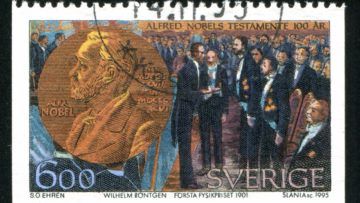Scotty Hendricks at Big Think:
 Nobel Prizes used to be awarded fairly quickly after the discovery, achievement, or event that prompted them. The instructions left by Alfred Nobel seemed to warrant this speed. However, this has occasionally led to awards for discoveries that later turned out to be bunk. Perhaps no case of this is clearer-cut than the 1926 prize in medicine, which was awarded “for [Fibiger’s] discovery of the Spiroptera carcinoma.”
Nobel Prizes used to be awarded fairly quickly after the discovery, achievement, or event that prompted them. The instructions left by Alfred Nobel seemed to warrant this speed. However, this has occasionally led to awards for discoveries that later turned out to be bunk. Perhaps no case of this is clearer-cut than the 1926 prize in medicine, which was awarded “for [Fibiger’s] discovery of the Spiroptera carcinoma.”
In brief, Dr. Fibiger’s research appeared to show that a certain roundworm parasite could cause cancer in rats. However, later experiments proved that the “cancers” he claimed to have observed were lesions caused by insufficient vitamin A. The roundworms he examined didn’t cause cancer, although certain parasites are known to do so.
More here.
